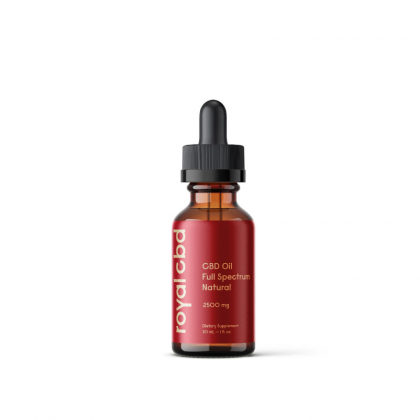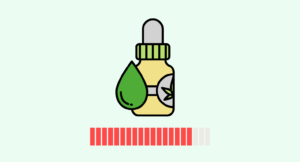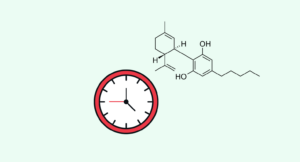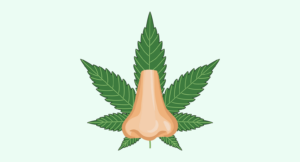| Total CBD: | 500 – 2500 mg |
| Potency: | 16.6 - 83.3 mg/mL |
| Cost per mg CBD: | $0.12 – $0.18 |
| Extract Type: | Full-spectrum |
| THC Content: | <0.3% |
Evidence based
CBD for IBD: Can It Help with Crohn's Disease & Ulcerative Colitis?
CBD is a powerful natural anti-inflammatory supplement.
New research suggests CBD oil as a promising new treatment option for IBD (Crohn’s & Colitis).
Inflammatory bowel diseases (IBD) can be frustrating.
It isn’t just the pain or bowel urgency — it interferes with all aspects of your life. IBD can cause you to miss work and social events when symptoms flare-up.
A compound found in the hemp plant called cannabidiol — or CBD for short — has been shown to offer benefits towards some of the negative symptoms of inflammatory bowel diseases.
In this article, you’ll learn how it works and how to use it effectively.
We’ll also cover some of the best CBD oils to use for IBD.
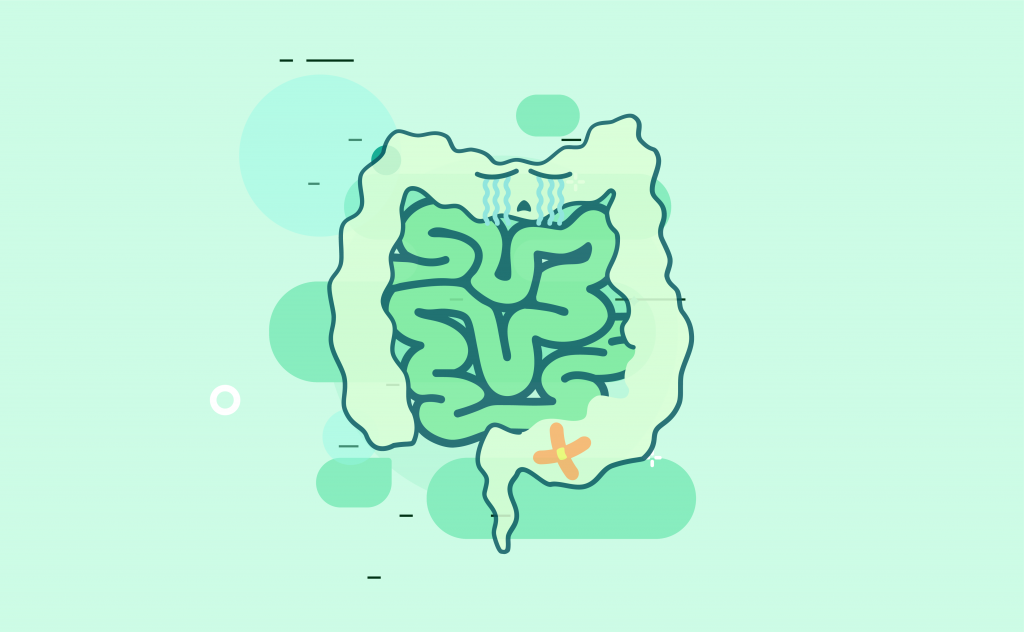
Best CBD Oils For Inflammatory Bowel Disease
- Royal CBD Oil — Best CBD For IBD Overall
- Phoria Turmeric Curcumin CBD Oil — Best CBD Oil For Inflammation
- Kiara Naturals CBD Pain Oil — Best CBD Herbal Formula For Inflammation
The Benefits of CBD For Inflammatory Bowel Disease
CBD influences many of the chemical messengers involved in controlling inflammation. This fantastic plant extract does this by acting on receptors within the endocannabinoid system.
What is the endocannabinoid system?
The endocannabinoid system (ECS) is a complex set of receptors found throughout the body, tasked with regulating inflammation and peristalsis (movement of intestines) in the gut and stress responses in the brain [1].
In the case of Crohn’s disease and ulcerative colitis, CBD has been shown to provide the following benefits:
- Reduces gut inflammation
- Supports the health of the microbiome
- Alleviates abdominal pain & cramping
Since CBD has been shown to reduce inflammation and interact with ECS receptors in the gut, it’s a promising supplement to help relieve some of the symptoms of IBD.
1. CBD Reduces Gut Inflammation
CBD has been shown to fight inflammation involved with many different types of inflammatory diseases — including IBD.
One of the ways it does this is by influencing the normal cycle of our cells. It binds to cell receptors known as the adenosine A2 receptors, which control what molecules are produced and secreted by cells around the body [16]. CBD binds to the A2 receptors to stop the cells from releasing compounds that trigger and perpetuate the inflammatory process — effectively halting inflammation at the source.
A second way CBD lowers inflammation with IBD is through its effect on the CB1 receptors of the endocannabinoid system itself. Its effect on these receptors stops the ability of specialized cells known as mast cells to release histamine [17] — a powerful inflammatory compound associated with allergies.
2. CBD May Support the Microbiome
Some research suggests that CBD can also impact the health of the microbiome. A dysfunctional microbiome is thought to be one of the main causes of inflammatory bowel disease.
Early research has suggested that the endocannabinoid system is involved with maintaining a healthy diversity of microorganisms in the gut lining [13] — though more research is needed to understand this effect in more detail.
3. THC & CBD May Alleviate Abdominal Pain & Cramping
THC (tetrahydrocannabinol) is also a well-known muscle relaxant — which can be used to stop the painful muscle contractions going on in the intestinal tract with IBD. This lowers abdominal cramping pain and improves motility in the digestive tract — resulting in less bloating, constipation, cramping, and feelings of fullness [14].
CBD also modulates the sensation of pain by stopping certain neurons from firing.
This occurs between secreted endocannabinoids and their receptors. While endocannabinoids have been shown to indirectly affect opioid receptors, it’s important to remember that endocannabinoids work within their own systems and do not interfere with other pain regulating systems. This is why THC and CBD do not have the same addictive qualities as morphine [15].

What is Inflammatory Bowel Disease?
Inflammatory bowel disease (IBD) is an umbrella term for two closely related conditions affecting the digestive tract — ulcerative colitis and Crohn’s disease.
What’s the difference between these two conditions?
1. Ulcerative Colitis
Ulcerative colitis (UC) is defined as a long-term inflammation of the large intestine and colon. The inflammation becomes so bad it eventually forms ulcers and erosions in the digestive lining.
The extensive damage to the digestive lining may reduce the number of nutrients we can absorb through the digestive tract and can affect our ability to keep harmful substances out of the bloodstream (leaky gut syndrome).
People with ulcerative colitis tend to have less healthy bacteria and more harmful species compared with healthy people — a condition called dysbiosis.
Dysbiosis in the gut causes disruptions to the intestinal environment due to the metabolites produced by the more harmful bacteria. These metabolites cause inflammation, which then causes more damage to the surface of the intestinal walls.
This all leads to a cycle of inflammation that gets increasingly worse over time [4].
Symptoms of Ulcerative Colitis
- Pain (often severe)
- Cramping
- An urgent need to use the toilet
- Blood loss in the stool
- Weakness
- Frequent allergies
- Mood changes
2. Crohn’s Disease
Crohn’s disease is also a result of long-term inflammation. However, the inflammation involved with Crohn’s occurs in patches along the intestinal tract. This is different from ulcerative colitis which can affect the entire digestive tract.
These patches of inflammation from Crohn’s disease is most common at the end of the small intestine where it connects to the large intestine (called the terminal ileum).
The inflammation from Crohn’s disease goes deep. Compared with ulcerative colitis, which affects only the mucosa layer of the intestine, Crohn’s disease extends from the mucosa to the outer layer — causing severe pain and loss of digestive function.
Like UC, dysbiosis of the intestinal environment is present with Crohn’s disease. Harmful species of bacteria are able to outcompete healthy gut flora. These harmful bacteria wreak havoc by producing inflammation-inducing metabolites — making symptoms progressively worse over time.
Symptoms of Crohn’s Disease
- Pain in the digestive tract
- Autoimmune symptoms
- Weight loss or gain
- Headaches
- Fatigue
- Diarrhea/constipation
How is IBD Diagnosed?
IBD usually takes three to five months to be diagnosed after the first symptoms appear.
Doctors consider your medical history, family medical history, physical examinations, lab testing, and medical imaging to confirm their suspicions before making a diagnosis.
IBD is usually first diagnosed between the ages of 20 and 30 but can remain undiagnosed for years before it’s discovered. Symptoms are often subtle and hard to notice until the disease progresses.
What Causes IBD?
The causes of both ulcerative colitis and Crohn’s disease are still not well understood.
However, four environmental factors have been shown to impact the genes of people predisposed to the condition — this means that certain environmental factors can trigger the condition.
Four Factors That May Trigger IBD:
- Smoking
- Diet low in fiber and high saturated fats
- Bacterial gut infection
- Low vitamin D levels [4]
Inflammation is a problem in both UC and Crohn’s disease. Therefore, it makes sense that all the above risk factors either cause inflammation directly or cause dysbiosis in the gut. This imbalance of the bacterial population then leads to inflammation, leaky gut syndrome, and even more inflammation.
Genetics play a large role since our genes determine our immune system, and our immune system determines our gut flora. This is why certain people are more at risk than others to develop IBD.
If you add poor lifestyle choices or stress to the mix, it further increases the chances of developing IBD [5].
How is IBD Treated?
The 5 “R’s” Of Healing Inflammatory Bowel Disease
CBD products fit into the third and fourth points:
- Remove foods that trigger a reaction.
- Reduce inflammation and excessive immune response.
- Repair the intestinal lining by supporting microbiome health.
- Restore the function of the intestinal lining.
- Repletion of vitamins and minerals that are not adequately absorbed through the damaged intestine.
The most recent evidence of CBD’s benefits to inflammatory bowel diseases is focused on reducing inflammation, — which in turn helps to repair the gut lining and restore the health of the intestinal environment.
Here, we’ll explain how CBD works and why IBD sufferers consider using CBD to address their most debilitating side effects.
Supporting IBD With Dietary Changes
The primary goal here is to restore the gut microbiome, allowing beneficial bacteria to thrive instead of harmful ones.
Dietary Changes For IBD May Include:
- Increasing fiber intake
- Eating more fruits and vegetables
- Lowering saturated fat consumption
- Eating more anti-inflammatory foods
Lifestyle Modifications For IBD
Stress and lack of exercise are closely linked with IBD symptoms since both affect immune function. Performing regular movement (circulating more lymph fluid) and stress reduction techniques like meditation reduce the intensity of flare-ups.
Lifestyle Modifications May Include:
- Daily exercise
- Yoga and meditation
- Getting more sun exposure (to build up vitamin D levels)
- Ensure at least eight hours of sleep each night
- Identify and eliminate stress triggers
Prescription IBD Medications
The Main Types of Medications Given for IBD Include:
- Antispasmodics — such as dicyclomine, reduces spasms of the intestinal muscles. These spasms are what cause pain and discomfort for those suffering from IBD.
- Antidepressants — tricyclic antidepressants or selective serotonin reuptake inhibitors are often used to treat IBD. The former is better for diarrhea-predominant IBD and the latter for constipation-predominant IBD.
- Antibiotics — there are some studies that showed that taking the antibiotic Rifaximin reduced the severity of symptoms in some patients [6].
- Fecal Transplant — feces donated from a healthy individual is transplanted into the colon of an individual suffering from IBD. This process introduces healthy bacteria into the IBD-affected intestines [7].
Suggested Reading: Is CBD Oil Safe to Use With My Medication?
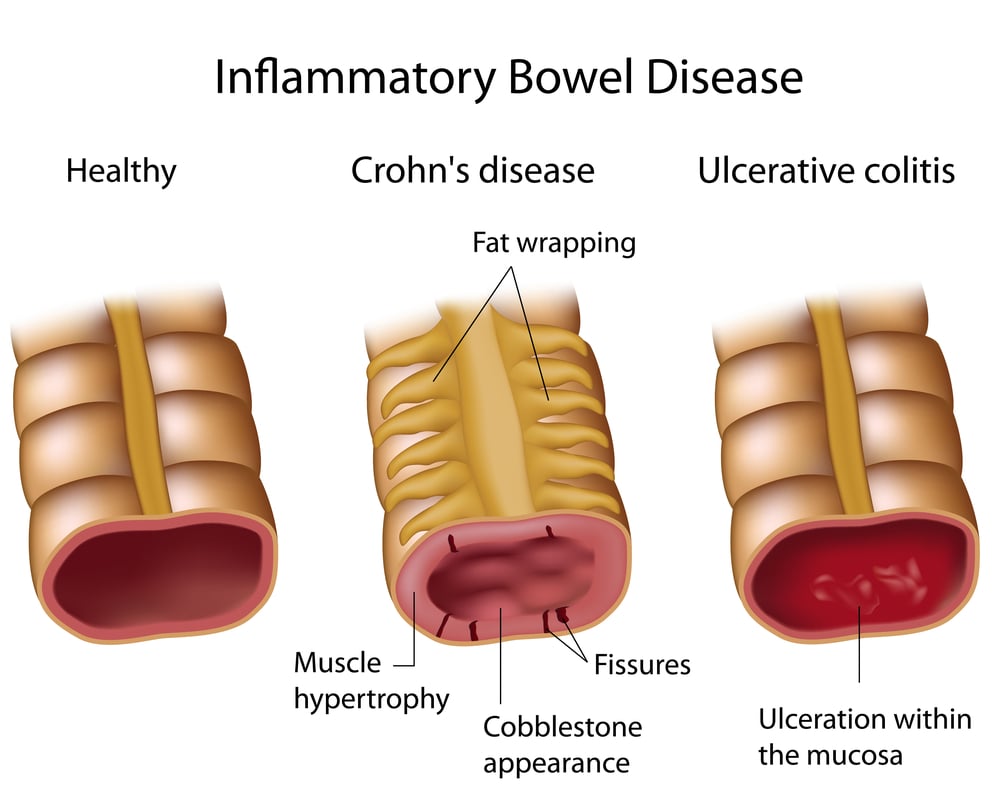
What Is CBD?
CBD (cannabidiol) is the primary non-psychoactive compound in the marijuana plant (Cannabis sativa). It works by acting on the endocannabinoid system — a series of receptors that form a communication pathway throughout the nervous and immune systems.
Research has identified two main types of endocannabinoid receptors — the CB1 and CB2 receptors [8]:
- CB1 receptors are located in the mucosal lining and neuromuscular layer of the colon [9].
- CB2 receptors are found on cells of the immune system [10].
Endocannabinoid receptors are found throughout the nervous system, either in the brain or on the cells that regulate neuron activity. This is why there is so much interest in using phytocannabinoids to treat any neurologically-related issues, including IBD.
The nervous system is the regulatory system that allows the brain to “talk” the other body systems. Understanding how the ECS works will allow us to take advantage of certain pathways and block unwanted symptoms and/or debilitating issues [12].
Let’s look more closely at why CBD should be included in the management of IBD.
Tips For Using CBD For IBD
Step 1: Source A High-Quality Full-Spectrum CBD Oil, Capsule, or Suppository
CBD comes in many different forms — so there’s a product for everybody.
If you don’t mind swallowing capsules, these are an excellent option for people with ulcerative colitis or Crohn’s disease.
CBD oil is another good option as it’s easy to measure individual doses, takes a long time to break down in the intestinal tract (ensuring it reaches the target area), and has a very long shelf-life.
Suppositories are also a good option but can be uncomfortable to use. These are best for IBD affecting the colon specifically (the last section of the digestive tract before leaving the body).
Always follow the directions on the packaging when using CBD suppositories.
For More Information on Finding the Best CBD Products, Check Out Some of Our Guides:
- CBD Oils — Best for all-purpose CBD use
- CBD Capsules — Best option if taking other supplements or medications at the same time
- CBD Suppositories — Best for inflammation in the large intestine (delivers CBD directly to the source)
Step 2: Assess Optimal Starting Dosage
Dosing CBD can be a challenge for first-time users. You can use our CBD dosing guide to assess the daily dose of CBD based on desired strength and weight (see chart below).
When using CBD for the first time, we recommend taking the smallest recommended dose and building up slowly over a week. This is a wise thing to do when starting any new supplement to see how it affects you.
CBD Dosage Calculator
Step 3: Take CBD for One Month, Then Reassess
Your IBD symptoms didn’t appear overnight — they took several months or years to manifest, and the truth of the matter is that it’s going to take a while to control as well. With patience and perseverance, IBD can be managed.
It’s important to be consistent with CBD (or any medication for that matter) when treating IBD.
It’s also a good idea to first consult with your doctor before taking any supplements.
Answer the Following Questions in Your Notes:
- What is your pain on a scale of 1-10? (10 being the worst pain of your life)
- Note your symptoms and how often you experience them (e.g., bloating, diarrhea, cramping)
- Keep track of the frequency of your bowel movements to determine if any change has occurred — how many times did you need to use the bathroom today?
- Are there any new symptoms?
- Have any symptoms disappeared?
After a solid month of use, go back and answer these questions again. Are there any improvements? Is anything worse?
CBD will likely take between 1 to 6 months of regular use before any noticeable changes are noted. Be patient and persistent.
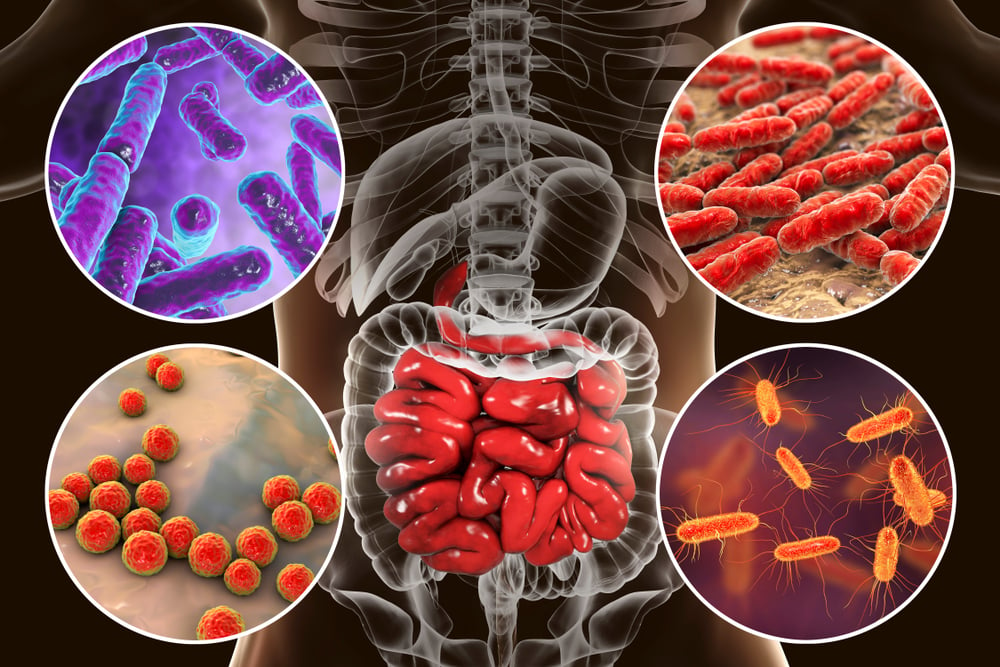
Summing it All Up: Can CBD Support IBD?
CBD may be an excellent add-on supplement for managing IBD symptoms through its pain-relieving and anti-inflammatory benefits. By decreasing inflammation, supporting healthy bacteria populations in the gut, and slowing peristalsis, CBD can relieve many of the symptoms of the IBD.
As the gut recovers, the health of the microbiome also recovers, reducing symptoms even further and restoring function to the protective effects of the gut lining.
For best results, it’s recommended that you use CBD oils or capsules in the higher potency range. Suppositories may be a good option for people with IBD specifically involving the colon. Always start with a small dose first, then build up over time.
Remember, IBD is a condition that involves many factors and took years to develop. In order to treat it properly, you’ll need to be patient, speak with your doctor, and try various treatments to find a combination that works for you.
References
- Sharkey, K. A., & Wiley, J. W. (2016). The Role of the Endocannabinoid System in the Brain-Gut Axis. Gastroenterology, 151(2), 252–266. doi:10.1053/j.gastro.2016.04.015
- De Filippis, D., Esposito, G., Cirillo, C., Cipriano, M., De Winter, B. Y., Scuderi, C., … Iuvone, T. (2011). Cannabidiol reduces intestinal inflammation through the control of neuroimmune axis. PloS one, 6(12), e28159. doi:10.1371/journal.pone.0028159
- Manzanares, J., Julian, M., & Carrascosa, A. (2006). Role of the cannabinoid system in pain control and therapeutic implications for the management of acute and chronic pain episodes. Current neuropharmacology, 4(3), 239–257.
- Zhao, H., Zhang, H., Wu, H., Li, H., Liu, L., Guo, J., … Zhang, X. (2012). Protective role of 1,25(OH)2vitamin D3 in the mucosal injury and epithelial barrier disruption in DSS-induced acute colitis in mice. BMC Gastroenterology. https://doi.org/10.1186/1471-230X-12-57
- Mawdsley, J. E., & Rampton, D. S. (2005). Psychological stress in IBD: new insights into pathogenic and therapeutic implications. Gut, 54(10), 1481-1491.
- Saadi, M., & McCallum, R. W. (2013). Rifaximin in irritable bowel syndrome: rationale, evidence and clinical use. Therapeutic advances in chronic disease, 4(2), 71–75. doi:10.1177/2040622312472008
- Wen, W., Zhang, H., Shen, J., Wei, L., & Shen, S. (2018). Fecal microbiota transplantation for patients with irritable bowel syndrome: A meta-analysis protocol. Medicine, 97(40), e12661. doi:10.1097/MD.0000000000012661
- Massa, F., Storr, M., & Lutz, B. (2005). The endocannabinoid system in the physiology and pathophysiology of the gastrointestinal tract. Journal of molecular medicine, 83(12), 944-954.
- Wright K, Rooney N, Feeney M, Tate J, Robertson D, Welham M, Ward S. Differential expression of cannabinoid receptors in the human colon: Cannabinoids promote epithelial wound healing. Gastroenterology. 2005;129(2):437–453.
- Atwood, B. K., & Mackie, K. (2010). CB2: a cannabinoid receptor with an identity crisis. British journal of pharmacology, 160(3), 467–479. doi:10.1111/j.1476-5381.2010.00729.x
- Kozela, E., Juknat, A., & Vogel, Z. (2017). Modulation of Astrocyte Activity by Cannabidiol, a Nonpsychoactive Cannabinoid. International journal of molecular sciences, 18(8), 1669. doi:10.3390/ijms18081669
- Lu, H. C., & Mackie, K. (2016). An Introduction to the Endogenous Cannabinoid System. Biological psychiatry, 79(7), 516–525. doi:10.1016/j.biopsych.2015.07.028
- DiPatrizio N. V. (2016). Endocannabinoids in the Gut. Cannabis and cannabinoid research, 1(1), 67–77. doi:10.1089/can.2016.0001
- Aviello, G., Romano, B., & Izzo, A. A. (2008). Cannabinoids and gastrointestinal motility: animal and human studies. Eur Rev Med Pharmacol Sci, 12(Suppl 1), 81-93.
- Manzanares, J., Julian, M. D., & Carrascosa, A. (2006). Role of the cannabinoid system in pain control and therapeutic implications for the management of acute and chronic pain episodes. Current neuropharmacology, 4(3), 239-257.
- Liou, G. I., Auchampach, J. A., Hillard, C. J., Zhu, G., Yousufzai, B., Mian, S., … & Khalifa, Y. (2008). Mediation of cannabidiol anti-inflammation in the retina by equilibrative nucleoside transporter and A2A adenosine receptor. Investigative ophthalmology & visual science, 49(12), 5526-5531.
- Samson, M. T., Small-Howard, A., Shimoda, L. M., Koblan-Huberson, M., Stokes, A. J., & Turner, H. (2003). Differential roles of CB1 and CB2 cannabinoid receptors in mast cells. The Journal of Immunology, 170(10), 4953-4962.
More Health Conditions to Explore
-
Conditions Related to Health Benefits
- CBD For Allergies: Can This Cannabinoid Ease Symptoms?
- Top 10 CBD Oils For Back Pain
- Can CBD Help With Menstrual Cramps?
- CBD for Sciatica: How It Works, Safety, Drug Interactions, & Best Products
- Is CBD a Viable Treatment for Cerebral Palsy?
- CBD Oil For Sleep
- CBD For Psoriasis: Can CBD Help to Alleviate Symptoms?
- Traumatic Brain Injury (TBI)
- Arthritis
- Anxiety & Depression
- Weight Loss
- ADD & ADHD
- Anorexia
- Alzheimer’s Disease & Dementia
- Addiction
- ALS (Amyotrophic Lateral Sclerosis)
- Antibiotic Resistance
- Asthma
- Atherosclerosis
- Autism
- Acne
- Bipolar Disorder
- Pain
- Crohn's Disease & Ulcerative Colitis
- Diabetes
- Epilepsy
- Endocrine Disorders
- Fibromyalgia
- Fatty Liver Disease
- Glaucoma
- Hypertension
- Heart Disease
- Huntington's Disease
- Inflammation
- Irritable Bowel Syndrome (IBS)
- Kidney Disease
- Migraine Headaches
- Muscle Recovery
- Multiple Sclerosis
- Motion Sickness
- Metabolic Syndrome
- Neurodegeneration
- Cancer
- Nausea
- Neuropathic (Nerve) Pain
- Osteoporosis/Bone Health
- Obsessive-Compulsive Disorder (OCD)
- Polycystic Ovarian Syndrome (PCOS)
- PTSD
- Prion/Mad Cow Disease
- Premenstrual Syndrome (PMS)
- Parkinson’s Disease
- Schizophrenia
- Sickle Cell Anemia
- Stroke
-
Conditions Related to Products
- Ranking The Top 13 THC Gummies By Category (Δ8, Δ9, Δ10, HHC, & More)
- Top 10 CBD Oils For Back Pain
- Everything You Need to Know About CBD Sunscreen
- Top 7 CBD Gummies For Sleep & Insomnia
- Top 7 CBD Gummies To Help With Anxiety (2022)
- Best CBD Gummies For Pain (Top-Rated Pain Gummies For 2022)
- Best Hemp Cigarettes (Top 5 Nicotine-Free Smokes)
- Top 5 CBD Lip Balms For 2022
- The Top 7 CBD Face Masks for 2022
- The Best CBD Inhalers For 2022 (& How to Use Them)
- Best Full-Spectrum CBD Vape Juice: What to Look For & How to Use It
- CBD Eye Drops: New Option For Glaucoma?
- CBD Oil For Dogs With Arthritis
- Best CBD Massage Oils In 2022
- Buyer's Guide To The Best CBD Vape Kits In 2022
- CBD Chocolate: Yes, It Exists & It's Just as Divine as it Sounds
- CBD Pre-Rolls & Cigarettes
- Terpene Concentrates
- Best CBD Soaps
- Best CBD Shampoo & Conditioner
- Best CBD Juul Pods
- CBD Isolate Oils
- Full-Spectrum CBD Oils
- Best CBD Lube
- CBD Honey
- CBD Transdermal Patches
- Best Dry Herb Vaporizers
- CBD Oil For Dogs With Epilepsy
- CBD Oil For Dogs With Anxiety
- CBD Oil For Dogs With Cancer
- CBD For Horses
- CBD Chewing Gum
- CBD Pain Cream
- CBD Oil For Cats
- CBD Oil For Dogs
- CBD Hemp Flower
- CBD Suppositories
- Best CBD Gummies for Pain, Sleep & Anxiety Reviewed (2022)
- CBD Teas
- CBD Vape Pens
- CBD Vape Oils
- CBD Coffee
- CBD Drinks & Shots
- CBD Crystals
- CBD Skincare
- Best CBD Oil & Gummies For Kids: Is CBD Safe for Children with Anxiety & ADHD?
- CBD Concentrates
- CBD Bath Bombs
- CBD Capsules
- CBD Sprays
- CBD Dog Treats
-
Conditions Related to Topicals
-
Conditions Related to Oils & Tinctures
-
Conditions Related to Edibles
- Top 7 CBD Gummies To Help With Anxiety (2022)
- Best CBD Gummies For Pain (Top-Rated Pain Gummies For 2022)
- CBD Chocolate: Yes, It Exists & It's Just as Divine as it Sounds
- CBD Honey
- CBD Chewing Gum
- Best CBD Gummies for Pain, Sleep & Anxiety Reviewed (2022)
- CBD Teas
- CBD Coffee
- CBD Drinks & Shots
- CBD Capsules
-
Conditions Related to Gummies
- Ranking The Top 13 THC Gummies By Category (Δ8, Δ9, Δ10, HHC, & More)
- Top 7 CBD Gummies For Sleep & Insomnia
- Top 7 CBD Gummies To Help With Anxiety (2022)
- Best CBD Gummies For Pain (Top-Rated Pain Gummies For 2022)
- Best CBD Gummies for Pain, Sleep & Anxiety Reviewed (2022)
- Best CBD Oil & Gummies For Kids: Is CBD Safe for Children with Anxiety & ADHD?
-
Conditions Related to Hemp Flower
-
-
Conditions Related to Terpenes
-
-
Conditions Related to Cultivation
-
Conditions Related to Concentrates
-
Conditions Related to Delta 8 THC
-
Conditions Related to Delta 9 THC
-
-
-
-
Conditions Related to CBD
- Everything You Need to Know About CBD Sunscreen
- Top 7 CBD Gummies For Sleep & Insomnia
- Top 7 CBD Gummies To Help With Anxiety (2022)
- Best CBD Gummies For Pain (Top-Rated Pain Gummies For 2022)
- Best Hemp Cigarettes (Top 5 Nicotine-Free Smokes)
- Top 5 CBD Lip Balms For 2022
- The Top 7 CBD Face Masks for 2022
- The Best CBD Inhalers For 2022 (& How to Use Them)
- Best Full-Spectrum CBD Vape Juice: What to Look For & How to Use It
- CBD Eye Drops: New Option For Glaucoma?
- CBD Oil For Dogs With Arthritis
- Best CBD Massage Oils In 2022
- Buyer's Guide To The Best CBD Vape Kits In 2022
- CBD Chocolate: Yes, It Exists & It's Just as Divine as it Sounds
- CBD Pre-Rolls & Cigarettes
- Best CBD Soaps
- Best CBD Shampoo & Conditioner
- Best CBD Juul Pods
- CBD Isolate Oils
- Full-Spectrum CBD Oils
- Best CBD Lube
- CBD Honey
- CBD Transdermal Patches
- CBD Oil For Dogs With Epilepsy
- CBD Oil For Dogs With Anxiety
- CBD Oil For Dogs With Cancer
- CBD For Horses
- CBD Chewing Gum
- CBD Pain Cream
- CBD Oil For Cats
- CBD Oil For Dogs
- CBD Hemp Flower
- CBD Suppositories
- Best CBD Gummies for Pain, Sleep & Anxiety Reviewed (2022)
- CBD Teas
- CBD Vape Pens
- CBD Vape Oils
- CBD Coffee
- CBD Drinks & Shots
- CBD Crystals
- CBD Skincare
- Best CBD Oil & Gummies For Kids: Is CBD Safe for Children with Anxiety & ADHD?
- CBD Concentrates
- CBD Bath Bombs
- CBD Capsules
- CBD Sprays
- CBD Dog Treats
-
-
Conditions Related to THC-O
-
-
Conditions Related to Joint Health
-
Conditions Related to Pain Disorders
- Top 10 CBD Oils For Back Pain
- Can CBD Help With Menstrual Cramps?
- CBD for Sciatica: How It Works, Safety, Drug Interactions, & Best Products
- Traumatic Brain Injury (TBI)
- Arthritis
- Pain
- Fibromyalgia
- Glaucoma
- Inflammation
- Kidney Disease
- Migraine Headaches
- Multiple Sclerosis
- Neuropathic (Nerve) Pain
- Premenstrual Syndrome (PMS)
- Sickle Cell Anemia
-
Conditions Related to Autoimmune Disease
-
Conditions Related to Cognitive Health
-
Conditions Related to Metabolic Disorders
-
Conditions Related to Psychological Disorders
-
Conditions Related to Muscles & Bones
-
Conditions Related to Nervous System
- CBD for Sciatica: How It Works, Safety, Drug Interactions, & Best Products
- Is CBD a Viable Treatment for Cerebral Palsy?
- CBD Oil For Sleep
- Traumatic Brain Injury (TBI)
- Anxiety & Depression
- ADD & ADHD
- Anorexia
- Alzheimer’s Disease & Dementia
- Addiction
- ALS (Amyotrophic Lateral Sclerosis)
- Autism
- Bipolar Disorder
- Epilepsy
- Huntington's Disease
- Inflammation
- Migraine Headaches
- Multiple Sclerosis
- Motion Sickness
- Neurodegeneration
- Neuropathic (Nerve) Pain
- Obsessive-Compulsive Disorder (OCD)
- PTSD
- Prion/Mad Cow Disease
- Parkinson’s Disease
- Schizophrenia
-
-
Conditions Related to Reproductive Health
-
Conditions Related to Hormones & Endocrine
-
Conditions Related to Skin Health
-
Conditions Related to Cardiovascular System
-
Conditions Related to Digestive System
-
Conditions Related to Genetic Disorders
-
Conditions Related to For Children


